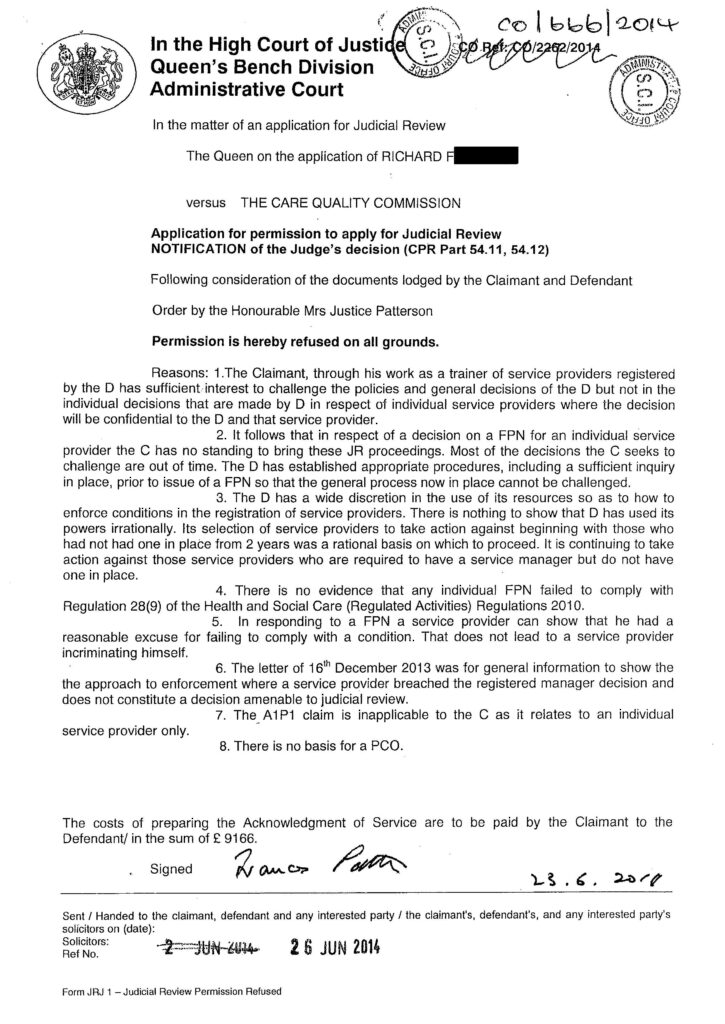

In February 2014 I filed an application for judicial review of the CQC policy blanket fixed penalty notices for care services that did not have a registered manager. These were dished out regardless of compliance with the regulations, indeed not a single one was the result of a statutory inspection. This was an abuse of the process of law, and is covered elsewhere on this site.
As I was a consultant to care providers on regulatory matters, the judge accepted that I had standing for the application in that capacity. No problem there. Permission for judicial review was however refused on the ground that I did not have standing to act for the homes that had been the subject of those notices. Note the reference to “trainer”, a ‘demotion’ from my stated position as “consultant” typical of judges who are biased against litigants in person – a “trainer” would not advise on individual regulatory matters, diminishing their ‘interest’ in such an application.
As stated very clearly on the application form, and as argued equally clearly in 65 pages of Grounds, the application concerned the policy and not the individual decisions. There was no argument in the application as to individual decisions. There was no documentation in relation to individual decisions.
It is crucial to realise that an application for judicial review is vetted – very thoroughly, I might add – by the legal team at the Administrative Court. You post an application to a seriously knowledgeable legal team, not direct to the judge! They prepare the papers before they go through to the judge. In particular, any obstacle to the application will be resolved before a judge has any knowledge of it.
Not being a firm of solicitors, I would not have had standing to act for providers. Had the application contained the merest hint that I was acting for someone else, the court officers would have required me to confirm that I was a firm of solicitors, and the application would never have got as far as a judge! In fact the High Court had tightened up its procedures in this very area in late 2013. Mistakes don’t happen.
The judge who refused permission was Mrs Justice Frances Patterson DBE. Crown Court Recorder from 2000, Deputy High Court Judge from 2008, Patterson J had been a High Court judge since October 2013, and had recently been the Lead Judge of the Planning Court. As a judge of long experience, Mrs Patterson could not have had an honest belief that I was acting for any another person including any care provider. (She died in December 2016.)
The policy was the brainchild of the then Chief Executive of the Care Quality Commission, David Behan. Before taking up post at CQC, Behan had been the Director of Social Care at the Department of Health from September 2006. Mrs Patterson was appointed Public Law Commissioner at the Law Commission for a period of five years in December 2009. Behan and Patterson had longstanding, closely similar professional interests in the reform of adult social care and had spoken at the same conferences on this field. Both had appeared before Commons committees on the same field, e.g. in the 14th Report of the Commons Health Committee, published 1st February 2012. Patterson’s project on A New Legal Framework for Adult Social Care in 2011 had been sponsored by the Department of Health at a time when Behan was its Director General of Social Care. There was thus a longstanding personal and professional relationship between the judge and the Chief Executive of the Respondent.
I stress that nothing wrong or improper is implied in the close working relationship (personal and professional) between two of the leading ‘movers and shakers’ in adult social care in this country in recent years. However, there is a principle in our justice system that the appearance of bias must be avoided at all costs, and the only proper course of action would have been for Mrs Patterson to recuse from hearing the application as soon as she realised that the Respondent was a professional colleague and personal friend with whom she would have been on first name terms for years.
Mrs Justice Patterson was not ‘offered’ the case. She was tipped off, and intervened to save a friend from embarrassment.
In an act of gross corruption.